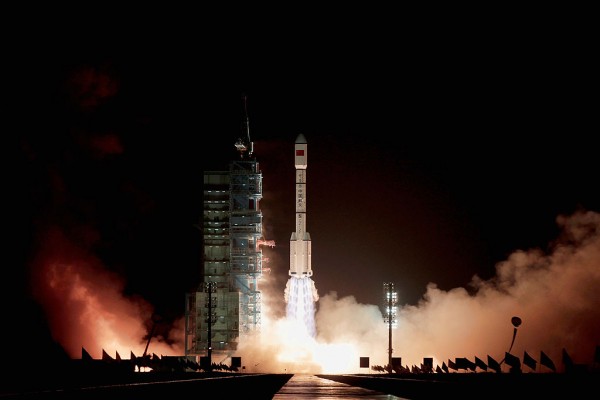By Ana Verayo, | September 21, 2016

A Long March 2F rocket carrying China's first space laboratory module Tiangong-1 lifts off from the Jiuquan Satellite Launch Center in Jiuquan, Gansu province of China.
China has announced that its defunct Tiangong-1 space station will crash down to Earth next year. Chinese space authorities have since confirmed that they have lost control of the orbiting space lab.
China's first orbiting space laboratory, known as the Tiangong-1 (or the "Heavenly Palace") was part of the country's ambitious space program launched in 2011. The space lab ceased operations earlier this year. Scientists launched China's second space lab last week, the Tiangong-2.
Like Us on Facebook
Officials say that the unmanned 8.7 ton Tiangong-1 is set to re-enter the planet's atmosphere some late in 2017.
According to Wu Ping, the deputy director of China's manned space engineering office, based on latest calculations and analysis, a majority of the space lab's parts would burn up during its descent.
China lost control of the space station due to a technical failure.
Experts such as Harvard astrophysicist Jonathan McDowell say that this announcement means China's space station will end up as space debris, re-entering the Earth's atmosphere naturally. He said that it would be impossible to pinpoint where the debris will land.
McDowell explained that even when the space station enters Earth's atmosphere, it would not be until a few hours before impact that scientists would be able to predict when and where it is going to fall. Changes in atmospheric conditions can also affect where the space debris will land.
Most parts of the space station will disintegrate as it burns up in the atmosphere. However, some parts--like rocket engines--are so dense that they will not completely burn up. There might be a residual 100 kilograms of lumps of metal, McDowell said.
After four and half years in orbit, the Tiangong-1 is considered to be one of the most important scientific contributions that China has made to the world. Wu claims that its return to Earth is unlikely to affect any aviation activities or cause widespread damage to the ground. He said if necessary, China will release an international forecast about when and where it will fall.
-
Use of Coronavirus Pandemic Drones Raises Privacy Concerns: Drones Spread Fear, Local Officials Say

-
Coronavirus Hampers The Delivery Of Lockheed Martin F-35 Stealth Fighters For 2020

-
Instagram Speeds Up Plans to Add Account Memorialization Feature Due to COVID-19 Deaths

-
NASA: Perseverance Plans to Bring 'Mars Rock' to Earth in 2031

-
600 Dead And 3,000 In The Hospital as Iranians Believed Drinking High-Concentrations of Alcohol Can Cure The Coronavirus

-
600 Dead And 3,000 In The Hospital as Iranians Believed Drinking High-Concentrations of Alcohol Can Cure The Coronavirus

-
COVID-19: Doctors, Nurses Use Virtual Reality to Learn New Skills in Treating Coronavirus Patients







